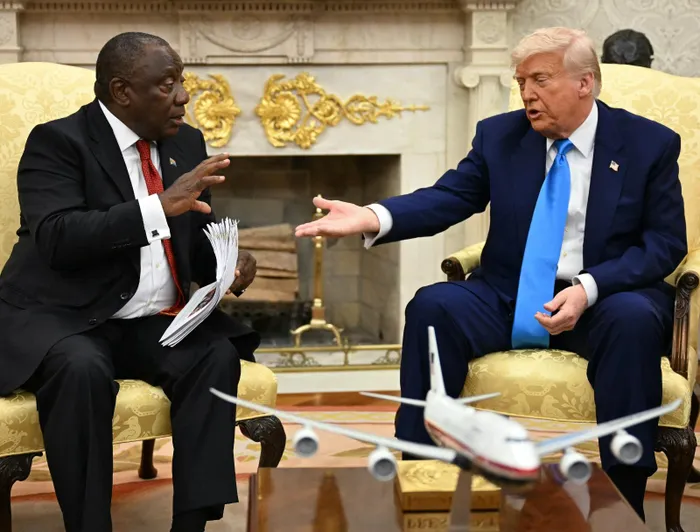How business interests are shaping South Africa's foreign policy

US President Donald Trump hands papers with news clippings of alleged farm murders to President Cyril Ramaphosa during a meeting in the Oval Office of the White House in Washington.
Image: AFP
In the evolving landscape of South African diplomacy, recent developments suggest a concerning trend: economic interests are increasingly dictating foreign policy decisions.
The recent meeting between President Cyril Ramaphosa and U.S. President Donald Trump in the Oval Office serves as a stark illustration of this shift. While economic considerations are undeniably crucial, the growing influence of business interests in shaping foreign policy raises pertinent questions about the nation's commitment to democratic principles and the public's expectations.
The Oval Office Encounter: A Diplomatic Misstep?
On May 21, Ramaphosa engaged in a high-profile meeting with Trump, accompanied by business magnates including Johann Rupert and Elon Musk.
The discussion, initially intended to bolster trade relations, veered into contentious territory when Trump presented unsubstantiated claims of "white genocide" in South Africa, referencing videos and articles that the South African government promptly debunked.
Despite Ramaphosa's composed rebuttal, the presence of business figures during such a sensitive diplomatic exchange was perceived by many as an undue commercial influence on state affairs.
This incident underscores a growing concern: the prioritisation of economic interests may be overshadowing the nation's democratic values and the principles upon which its foreign policy was initially founded.
Economic Diplomacy: A Double-Edged Sword
South Africa's recent foreign policy initiatives reflect a pronounced emphasis on economic diplomacy. The Government of National Unity, formed after the elections, has articulated a clear agenda centred on economic growth, job creation, and industrial development. This approach includes courting foreign investments, exemplified by proposals to purchase U.S. liquefied natural gas (LNG) and securing trade deals with entities like Starlink and the European Union.
While these economic endeavours are essential for the nation's development, they also raise questions about the extent to which business interests are influencing diplomatic decisions. The involvement of corporate leaders in high-level meetings, such as the one with Trump, blurs the lines between public policy and private enterprise, potentially compromising the integrity of diplomatic engagements.
The Role of Politicians: Upholding Public Interests
The core responsibility of elected officials is to represent the interests of their constituents, not those of private corporations. The increasing intertwining of business interests with state affairs suggests a shift away from this fundamental duty. Politicians are entrusted with the mandate to make decisions that reflect the values and needs of the public, ensuring that foreign policy serves the broader societal good rather than the profit motives of a few. The presence of business magnates in diplomatic settings, particularly during sensitive discussions, can be perceived as an endorsement of their commercial interests, potentially sidelining the public's concerns. This dynamic challenges the notion of a government that is accountable to its people and raises ethical questions about the influence of wealth on policy decisions.
The Need for Transparent and Inclusive Diplomacy
To restore public trust and uphold democratic principles, South Africa's foreign policy must prioritise transparency, inclusivity, and accountability. Diplomatic engagements should be conducted with a clear focus on national interests, ensuring that decisions are made in the best interest of all South Africans, not just a select few. This necessitates a reevaluation of the role of business leaders in diplomatic affairs. While their insights can be valuable, their involvement should not overshadow the primary objective of serving the public's interests. Establishing clear boundaries between private enterprise and state affairs is crucial to maintaining the integrity of foreign policy.
Reaffirming Democratic Values
The recent diplomatic developments underscore a critical juncture in South Africa's foreign policy trajectory. While economic considerations are vital, they should not eclipse the nation's commitment to democratic values and the public's expectations. Elected officials must reaffirm their dedication to representing the interests of their constituents, ensuring that foreign policy decisions are made transparently and inclusively.
As South Africa continues to navigate the complexities of international relations, it is essential to strike a balance between economic ambitions and the principles of democracy. By doing so, the nation can develop a foreign policy that truly reflects the aspirations and values of its people, thereby safeguarding its democratic integrity.
*Mayalo is an independent analyst
** The views expressed do not necessarily reflect the views of IOL, Independent Media or The African.
Related Topics:
